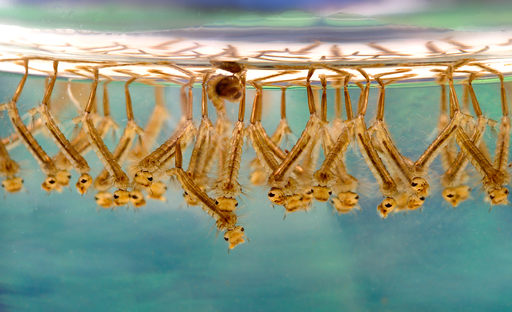Cooler Temperatures Predispose Mosquitoes to Infectious Disease Viruses

While mosquito-borne infectious diseases like malaria, dengue fever, and the West Nile virus are mostly endemic to tropical regions with warm climates, a new study finds that that mosquitoes bred in cooler temperatures are actually more likely to carry the contagious viruses that can easily transmit to humans, since they have weakened immune systems.
Virginia Tech researchers, led by entomology professors Zach Adelman and Kevin Myles, investigated the relationship between temperature and the mosquito immune system by genetically engineering mosquitoes with temperature-based immune sensitivity.
The results, published last week in the open-access journal PLOS Neglected Tropical Diseases, suggest that the geographic risk of mosquito-borne diseases might shift considerably as global climate change accelerates in the coming decades.
"Mosquitoes like to breed and lay their eggs in dark, cool places because that means the water will last longer," Adelman explained in a news release. Water in warm, sunny spots is likely to evaporate before the eggs can hatch.
"Although this has been known of some time, we are just learning about its potential [effects] on the mosquito immune response. Hopefully, this information can be used to build better models that more correctly predict when we'll have disease transmission."
The researchers found that the mosquito's RNA interference pathway, which is essential to immunity against viruses, is hampered when the eggs hatch in cooler temperatures, making them more likely to carry disease-causing viruses like yellow fever and chikungunya.
Myles and Adelman say in their paper that while current models of mosquito-borne disease transmission mostly consider how temperature affects the mosquitoes' risk of spreading infections in adulthood, theirs focuses on the effects of temperature on mosquito physiology before virus exposure.
"Our data offers a plausible hypothesis for how changes in weather influence the transmission of these diseases and will likely continue to do so in the future," said Myles in the news release.
Instead of focusing solely on the general increases in temperature that might occur with global climate change, public health researchers should take into account the cool and shaded "microclimates" that remain as favorable breeding sites for disease vector mosquitoes like Aedes aegypti.
For example, they note that during the dengue fever transmission season in Buenos Aires, Argentina, from January to March, temperatures in shaded areas are about 10°C cooler than in sunlit areas.
As global climate change makes temperatures more unpredictable, it seems that outbreaks of mosquito-borne viruses are becoming more common in unexpected places. Chikungunya virus outbreaks occurred in Italy and France in 2007 and 2010, for example, and since West Nile virus arrived in New York City in 1999, it's gone as far west as Illinois and Pennsylvania this year.
Source: Adelman ZN, Anderson MAE, Wiley MR, et al. Cooler Temperatures Destabilize RNA Interference and Increase Susceptibility of Disease Vector Mosquitoes to Viral Infection. PLoS Negl Trop Dis, 2013.
Published by Medicaldaily.com



























